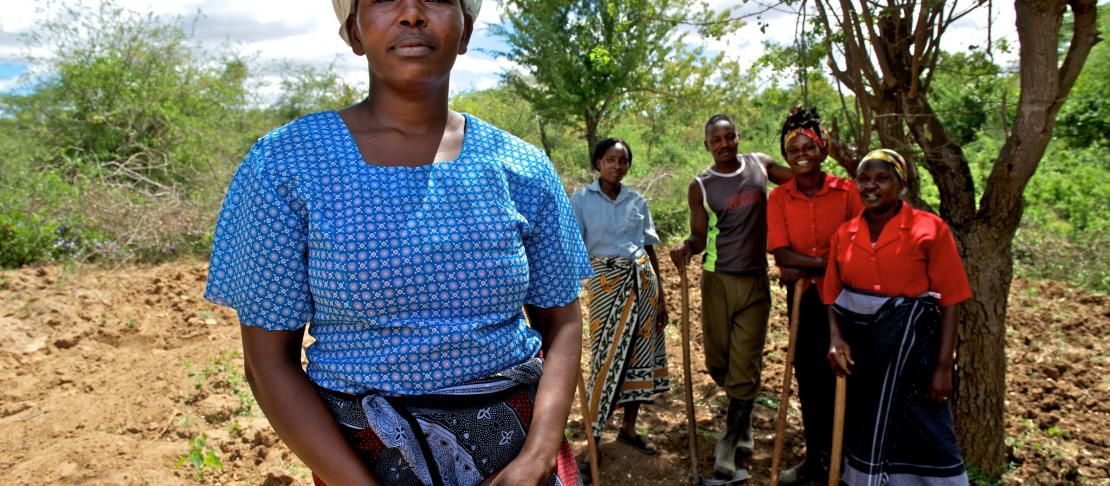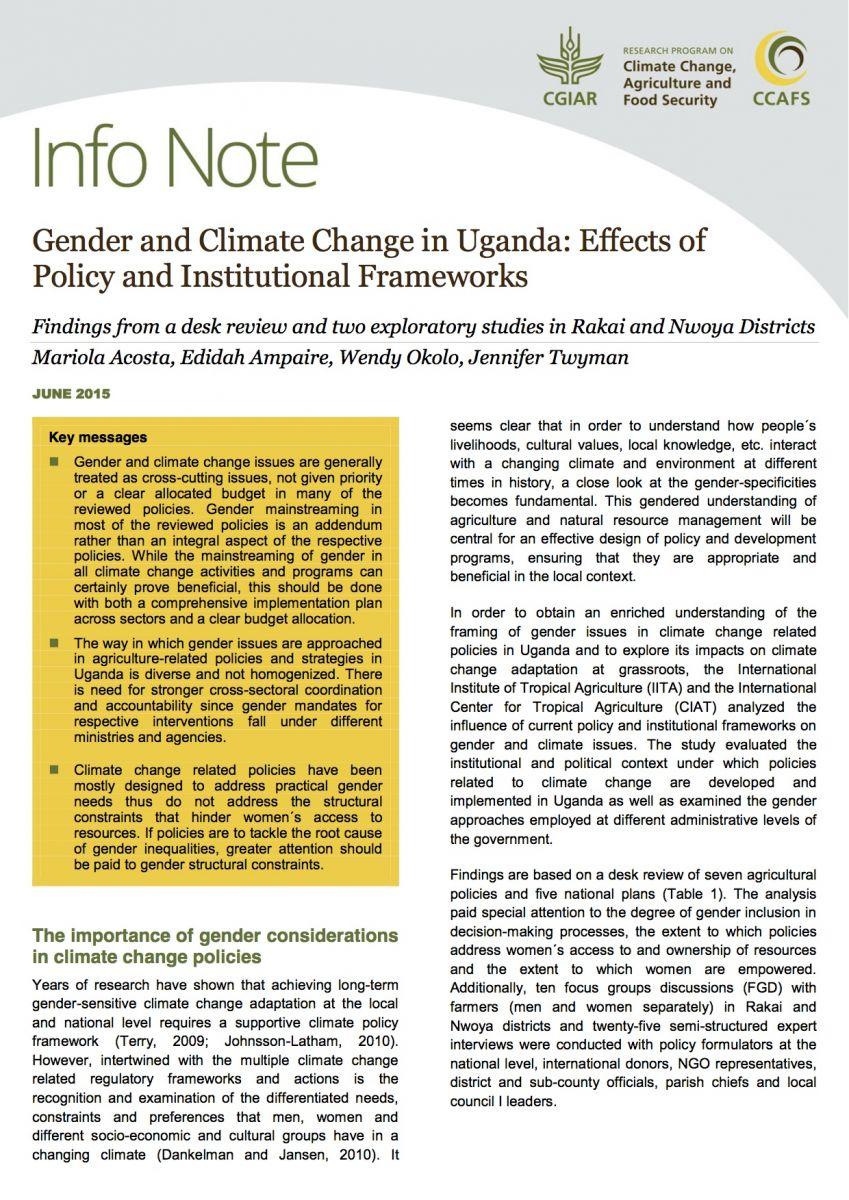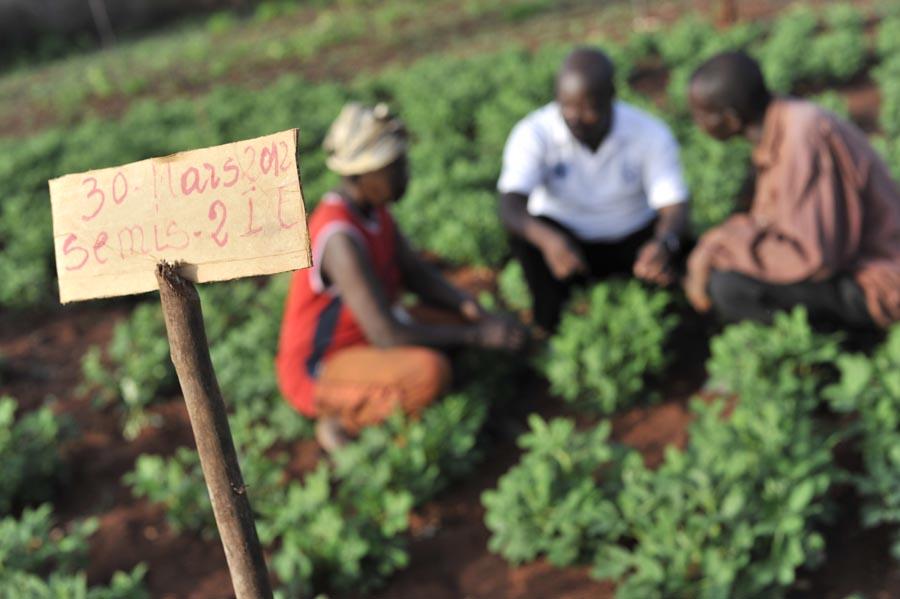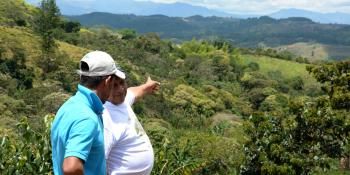Does Uganda sufficiently address gender inequalities in climate policies?

New Info Note analyses Uganda's climate and development policies from a gender perspective.
The community development office in Nwoya district Uganda gets really busy around December. This is when the main harvest season kicks off and dozens of upset couples flood the office seeking fair solutions to their yeild conflicts.
As heads of the households and official owners of the land, the men think that any profit made from produced crops and vegetables on their property is rightfully theirs. On the other hand, frustrated women feel that since they’ve done the majority of work their husbands have no right to solely decide on how to allocate revenues, at least not without their input and say.
However, sometimes these disputes come at a cost. Women’s fight for equal rights and revenues can lead to domestic abuse cases. In fact, group discussions with farmers in Nwoya indicate an increase in gender-based violence that spikes during the main harvest season. To add to the mix, farmers feel these conflicts will most likely increase as the number of extreme climate events rise, leaving fewer resources and reduced harvests in their footsteps.
Even if the Ugandan Land Policy from 2013 grants women and men equal rights to own and co-own land, the reality is much different. In Nwoya much of the land is effectively held under customary arrangements which prevent most Acholi women to own land.
How gender-sensitive are national policies?
This brings forward questions related to national gender-sensitive policies, and how well they address customary regulations and laws, like the above case of Acholi women and land rights. Or, how well climate policies cater to women’s needs, and work to ensure climate change adaptation and resilience building take place on equal terms in the community.
A new Info Note published by the CGIAR Research Program on Climate Change, Agriculture and Food Security (CCAFS)  analyzes the current framing of women and gender issues in climate and development policies in Uganda, and the implications for implementation. The objective is to better understand how gender is addressed in national-level policies and where the main gaps are.
analyzes the current framing of women and gender issues in climate and development policies in Uganda, and the implications for implementation. The objective is to better understand how gender is addressed in national-level policies and where the main gaps are.
The Info Note was produced by gender researchers from the International Institute for Tropical Agriculture (IITA) and the International Centre for Tropical Agriculture (CIAT).
The research team studied seven agricultural policies and five national plans and facilitated focus group discussions in Rakai and Nwoya with men and women separately. The Info Note is a summary of a fuller report on gender, climate change and policy framework influence in Uganda which will come out later this year.
Policies are becoming more gender sensitive, but long road ahead...
The team found that, for example how the terminologies ”women” and ”gender” have been included and addressed in the various national plans, could reinforce gender stereotypes. Women are either pictured as vulnerable victims or associated with vulnerability, or they are, on the other hand, seen as “key agents of change” crucial for successful development and climate work. This is a common dichotomy in gender and climate change discourses.
The main issue with reinforcing gender stereotypes is that it simplifies development work. Instead, strategies need to focus on addressing key, structural gender-imbalances combined with further analysis, to better understand what women, and men, really need and want in order to successfully adapt to climate change.
But this is not done within the analysed policies. There are actually few attempts to try and focus on pre-existing, structural gender inequalities and power structures that underpin women’s status and role in society.
Although climate and development policies in Uganda have become more gender sensitive in the past few years, main challenges remain: actually implementating the policies; coordinating the work between ministries and institutions, as gender should be mainstreamed across multiple departments; and failing to address the structural constraints that hinder women’s access to resources.

New Info Note concludes Uganda does not sufficiently address structural and underlying gender inequalities in climate and development policies. Photo: ©FAO/Riccardo Gangale*
Fortunately, Nwoya women are starting to become more aware of their rights to land and property, and are starting to take action. The progress is partly due to the work of dedicated non-governmental organisations in the district. However, when it comes to policies and frameworks efficiently addressing and securing women's rights, there’s still a long way to go.
Through sharing these insights, the research team hopes policy makers, advisors and development practicioners in East Africa will be more aware of the current status of gender in policies. And also for these key players to understand how to better address gender inequalities in climate and development plans and policies, which help empower and strengthen women and men to effectively adapt to climate change and build a prosperous food secure future.
Download the Info Note: Acosta M, Ampaire E, Okolo W, Twyman J (2015). Gender and Climate Change in Uganda: Effects of Policy and Institutional Frameworks. CCAFS Info Note. Copenhagen, Denmark.
The Info Note was produced as part of the Policy Action for Climate Change Adaptation (PACCA) project, which is supported by CCAFS Flagship on Institutions and Policies and East Africa program. PACCA Project is led by the International Institute of Tropical Agriculture (IITA). Learn more, get in touch with Mariola Acosta (M.Acosta@cgiar.org)
Mariola Acosta is a Research Fellow at the International Institute of Tropical Agriculture (IITA) in Uganda and PhD candidate at Wageningen University. Blog edited by Cecilia Schubert, CCAFS FP4 Communications Officer.
*Copyright ©FAO. Editorial use only. CCAFS has been given permission to use this particular image.



